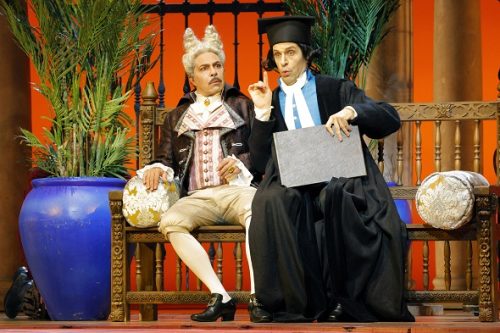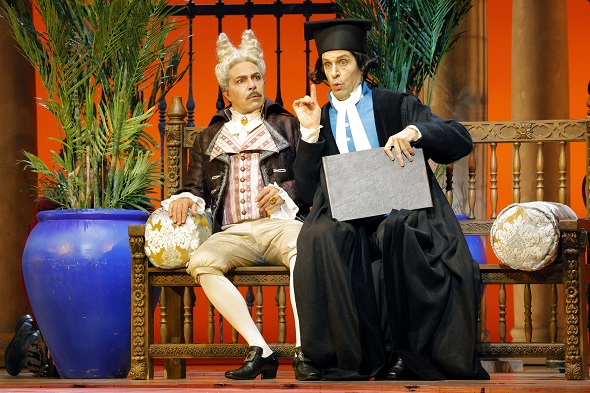 United States Rossini, The Barber of Seville: Soloists, Chorus and Orchestra of LA Opera / Louis Lohraseb (conductor). Dorothy Chandler Pavilion, Los Angeles, 21.10.2023. (JRo)
United States Rossini, The Barber of Seville: Soloists, Chorus and Orchestra of LA Opera / Louis Lohraseb (conductor). Dorothy Chandler Pavilion, Los Angeles, 21.10.2023. (JRo)

Production:
Director – Rob Ashford
Associate Director – Stephen Sposito
Sets – Scott Pask
Costumes – Catherine Zuber
Lighting – Pablo Santiago
Original Lighting – Howard Harrison
Chorus director – Jeremy Frank
Cast:
Figaro – Joshua Hopkins
Rosina – Isabel Leonard
Count Almaviva – Edgardo Rocha
Dr. Bartolo – Paolo Bordogna
Don Basilio – Luca Pisaroni
Berta – Kathleen O’Mara
Fiorello – Ryan Wolfe
Sergeant – Joel Balzun
For pure enjoyment, there is perhaps no more lovable opera in the canon than Rossini’s The Barber of Seville. Untainted by high seriousness, it nevertheless addresses the follies and foibles of human nature. Love, lust, greed and deception are treated with an affectionate hand thanks to Rossini’s effervescent score and Sterbini’s libretto, based on the Beaumarchais play.
On Saturday evening, LA Opera’s cast and orchestra reveled in the music and humor of this enduring gem. Loaded with talent both musical and theatrical, the singers were uniformly excellent. What was unique was the obvious chemistry between the two lovers, so rare on the opera stage. Isabel Leonard as Rosina and Edgardo Rocha as Count Almaviva were not only an attractive pair: their infatuation with each other electrified the production. To what lengths would a smitten Count not go to win the heart and hand of Leonard’s Rosina?
Leonard’s voice was in full flower – embellishments thrown off with ease, vocal power galvanizing in the sextets. Add to that her superb acting – even her facial expressions conveyed a world of meaning – and you have a delightful Rosina, believable as the headstrong and lovestruck heroine.
Edgardo Rocha as Almaviva embodied all the manifestations of the Count: first as Lindoro the student, next as a drunken soldier hoping to gain entry to Dr. Bartolo’s house where Rosina is kept under lock and key, then as Don Alonso, a music teacher and, finally, as the aristocratic Count. He engaged in each characterization with abandon, but lurking beneath the surface of his many disguises was the imperiousness of an aristocrat. It was a delicate balancing act, and Rocha pulled it off, his light lyric tenor growing in warmth as he dominated the denouement of Act II with ‘Cessa di piu resistere’.
As for Joshua Hopkins’s Figaro, the highest compliment I can pay is that I wanted him to keep singing all night. I could not get enough of his buttery baritone, the warm nonchalance of his ornamented notes and his sly, tantalizing portrayal of the wily servant. Even his body language was tossed off with the graceful air of seasoned dancer. Here was an affectionate Figaro who had seen it all, who both accepted and capitalized on man’s weaknesses.
In the best opera buffo tradition, the sprightly Paolo Bordogna as Dr. Bartolo and the lanky Luca Pisaroni as Don Basilio, delivered memorable performances with an aura of delicious malevolence. Pisaroni’s expressive bass and the surefire patter of Bordogna’s buffo singing were especially notable.

Rossini’s music and wit allow even minor roles to glow. Kathleen O’Mara as the maid Berta impressed with a luxurious soprano, Fiorello was sung by an impish Ryan Wolfe and the Sergeant of Joel Balzun was noteworthy.
The choreography was in the hands of director Rob Ashford. Snippets of flamenco were used for comic effect, casual tossing of hips and legs denoted craftiness, subtle ensemble dance steps imbued the proceedings with fun and suspense, and all was at the service of the score and scenario. In short, Ashford’s directing was sure, intelligent and playful.
One of the delights of Rossini’s opera is the openness of interpretation that he leaves to his singers – it is an airiness that allows for surprises. Louis Lohraseb’s conducting supported that dynamic and, overall, the orchestra’s sound was robust and effervescent. Unfortunately, in the final sextet from Act I the balance was off – the orchestra overpowered the singers.
Scott Pask’s tasteful sets evoked the Moorish/Spanish sensibility of Seville, and Catherine Zuber’s playful costumes were perfect, from the Daumier-inspired get-up of Don Basilio to the jaunty stripes of Figaro’s trousers and Rosina’s embroidered gowns. Lighting was effective, particularly for the storm in Act II with its shower of lightning in a purple sky.
Onstage at the Dorothy Chandler Pavilion in sunny Seville, the outside world melted away, replaced by the glow of Rossini’s beloved creation.
Jane Rosenberg
